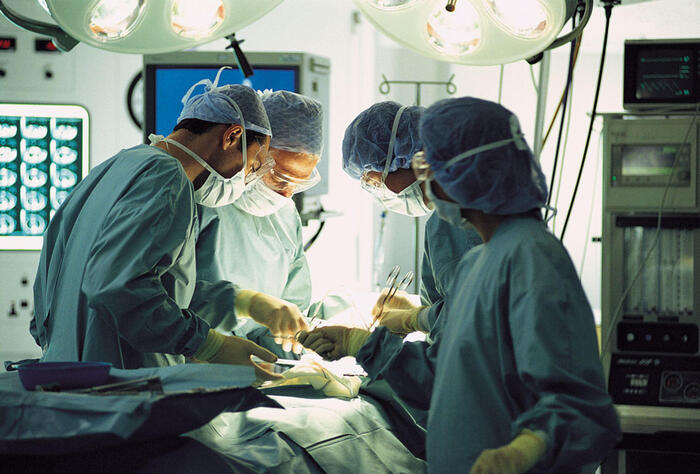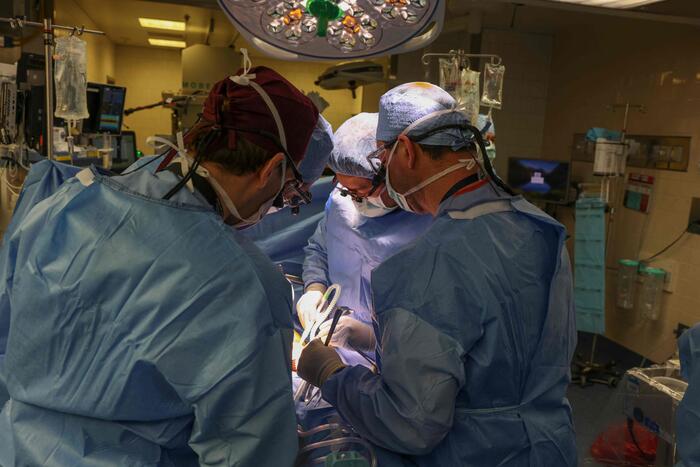Marco's greatest wish: A new heart - the eight-year-old is dependent on an organ donation
Created: 06/12/2022, 08:55
This is his third Christmas at the LMU Clinic: eight-year-old Marco is waiting there for a donor heart.
© LMU
Marco's heart muscle was irreversibly damaged.
His only wish for Christmas: a new heart.
The LMU-Klinikum promotes organ donation.
Munich – Marco hangs a glittering silver heart on the Christmas tree – and hopes that it will bring him luck.
That the redeeming call that he and his family have been waiting for for 918 days finally comes.
This Christmas is the third that the eight-year-old will spend on Ward G9, the pediatric cardiology ward at the University Hospital in Großhadern.
The waiting, the long uncertainty, the fear of the future - Marco shares this fate with hundreds of other affected people.
In February 2020 he fell ill with influenza, which did not heal completely and attacked his heart.
His heart muscle was irreversibly damaged.
An artificial heart has now been implanted for Marco.
And now he's waiting for a donor for a new, real heart.
Marco's greatest wish: A new heart - the eight-year-old is dependent on an organ donation
In order to attract more donors in the future, the hospital of the Ludwig-Maximilians-University Munich (LMU) is now breaking new ground: the hospital has produced a series of short films to promote organ donation.
The films are aimed at different age groups.
For example, there is a film with seniors who talk about the fact that they are too old to donate organs - only to find out that there is no age limit on this question.
“Even old people are suitable as donors if their organs are healthy.
But a lot of people don't know that, we want to change that," explains photographer Andreas Steeger, who, together with doctor Dr.
Laura Lily Rosenthal acted as idea generator for the films.
Daniel waited 976 days: "He didn't know how to slide or swing"
Swinging, sliding, seesawing – all of this frightened Daniel at first.
No wonder: playgrounds, romping around with other children, Daniel didn't really know that at all.
The now five-year-old waited 976 days, almost three years, in the clinic for a new heart.
Almost a year and a half ago the time had finally come: at the same time as Luca (text on the left), Daniel also got a new heart – after what seemed like an endless wait.
Now it's finally moving forward, because it lacks almost three years in its development.
So of course he had far less contact with other children.
He has been allowed to attend kindergarten since September.
Before that, he practiced being in contact with others at a childminder.
"I think that Daniel will be able to lead a completely normal life thanks to the donor heart," says his mother Diana Dietrich happily.
Of course with a few small restrictions that are nothing compared to the gift of life: He has to be careful with his diet, for example he is not allowed to eat anything raw.
He will always have to take his medication.
"We are infinitely happy and look forward to the future," says Mama Diana despite everything.
You have a lot of contact with transplant recipients:
"Some have lived with a donated heart for decades and are infinitely grateful," she says.
For all the fear she had over the years for Daniel, who suffered from the rare heart disease dilated cardiomyopathy, she now feels compensated a thousandfold: "We appreciate every little thing in a completely different way than before."
More than 700 patients in Germany are currently urgently waiting for a donor heart
Today, the "Films for Life" will be presented for the first time in a ceremony: In the film theater at Sendlinger Tor in Munich, the support association of the Cardiac Surgery Clinic of the LMU Clinic is showing the films that go hard on the heart: Among other things, they show an attractive woman by a pool, a Drink in hand, behind her a man caring for her, in front of her the children are playing.
At first glance, it seems like nothing is missing - until she opens the bathrobe and reveals the tubes that keep her alive.
In another film, a little girl is fooling around with her father until she suddenly loses consciousness because her heart is not working normally.
Or young people on skateboards who joke about the apparently very distant topic of organ donation until they are suddenly shocked by a serious accident.
The problem: More than 700 patients in Germany are currently urgently waiting for a donor heart.
Unfortunately, waiting for the redeeming call resembles a kind of gambling.
Because there are far too few organ donors: Last year, 310 hearts were donated in Germany, in Bavaria it was just 32. Some patients wait for years - and ten percent don't survive the waiting time.
Living in the moment: Franka has been living with a donor heart since 2019
Franka will be six years old in February.
"She's always in a good mood, a real ray of sunshine," says Mama Carolin: "She had a lot of fun in kindergarten and made a lot of friends there." This is also due to the irrepressible joie de vivre that Franka radiates.
After a cold as a baby, her heart muscle became inflamed and it was discovered too late.
She was already terminally ill and her heart was irreversibly destroyed.
On April 19, 2018, she was flown to Großhadern in a rescue helicopter, she was placed in an artificial coma, put on the heart-lung machine and then had an artificial heart inserted.
During these days she suffered several strokes that still have consequences today: Franka still cannot speak and is paralyzed on one side.
But she gets along well with these limitations, says her mother.
"She has an iPad to communicate and it works well."
Franka's heart is checked every three months, alternately by the pediatric cardiologist and in Großhadern.
The doctors have always been happy.
Only at the beginning, shortly after the transplant on September 29, 2019, was there a small rejection reaction.
But Franka and the doctors got it under control.
"It's looking really good at the moment," says Mama Carolin.
Franka's fate made her realize what a gift life is.
“We as a family have learned what we can do together.
Today we are not so afraid of the future and live in the moment.
We enjoy every hour together.”
In other European countries, those affected usually find a donor organ much faster
Dramatic numbers that affect heart surgeon Prof. Christian Hagl and his team at the LMU Clinic anew every day.
"People die almost every day that the doctors could actually have saved," complains the head of LMU cardiac surgery.
Around 40 percent of people in Germany have an organ donor card.
Before an organ donation, the relatives are always asked.
"It is very important to walk the path together with the relatives," says Prof. Hagl.
also read
Lufthansa plane was on the way to Munich: chaos for 270 passengers after an emergency landing in Angola
Munich benefits from checkout errors at Aldi – and proudly presents its loot
You can find more current news from Munich and the region at tz.de/muenchen.
In other European countries such as Spain or Austria, those affected usually find a donor organ much faster.
The reason: the so-called objection solution has been in effect there for years.
In Austria, for example, everyone is initially considered a potential organ donor.
If you don't want that, you have to object during your lifetime.
"The good thing is that everyone there has to deal with the topic," says Hagl.
In Germany, around eleven people donated organs for every million people who died in 2021.
In Austria there were almost twice as many.
And in Spain, where the opt-out solution also applies, there are four to five times as many organ donations.
This shortens the waiting times enormously.
In this country, however, it does not look as if the legal situation will change.
In this respect, the LMU-Klinik hopes
Pilot and co-pilot principle: This is how a heart transplant works
Size and blood group are decisive for whether a heart fits.
If a clinic that has a suitable recipient receives an offer, specialists immediately travel to see if the heart fits.
If that is the case, it is shut down, packed in a cool place and flown to Munich.
At the same time, the doctors in Munich are expanding the existing artificial heart.
"Meanwhile, we are always in contact with the transport and everyone knows where and how far the others are," explains heart surgeon Prof. Christian Hagl.
In the operating room, the doctors work according to the principle of pilot and co-pilot – there are two specialists, each of whom could also carry out the operation on his own.
Marco's mom Stefanie Schäfer has been counting every day for more than two years - that's how long the family has been waiting for a heart.
"Now there will soon be one for us," says the 40-year-old optimistically.
"We hope every day that the time has come and that the redeeming call will come."
"It's going uphill": Luca is overjoyed with his new heart
When he was 14 days old, Luca received an organ donor card.
Because he was born with half a heart.
The right ventricle was absent.
He underwent four surgeries, after which he did quite well for years.
But suddenly Luca got a so-called protein enteropathy as a result of his heart problems.
This weakened him a lot at the age of 13 – and at the same time the main artery, the aorta, was threatened with occlusion.
Luca underwent surgery and was fitted with a mechanical heart valve, followed shortly thereafter by a pacemaker.
That's not all: "In January 2020, I was completely surprised to learn that I needed a new heart," says the 18-year-old.
It was a very difficult year for him, his overall condition continued to deteriorate.
At times he was so weak that he was taken off the organ donation list because he probably wouldn't have survived such an operation in his condition.
Things went uphill from February 2021, when he was fitted with a Berlin Heart – an artificial heart for children.
His body slowly stabilized, and only four months later he was extremely lucky: a donor heart was there for him.
Since then, step by step, he has fought his way back to a normal life.
Luca is in tenth grade at a technical college.
He was even able to fulfill a long-cherished dream that year: a trip to Italy, where he was able to swim in the sea for the first time.
"It's going steeply uphill," he says happily.
To make Marco's long time in the clinic easier and to break up the monotony of the days that seem to stretch out endlessly, the doctors and nurses do their best.
Marco is allowed to decorate the Christmas tree, gets a lot of attention and surprises again and again: Next week, Josef Parzefall and Richard Oehmann from "Doctor Döblinger's tasteful Kasperltheater" will be performing the play "Kasperl und der Zwackilutschku" especially for Marco in the personal casino of the LMU-Klinikum.
Marco chose the piece and is really looking forward to the performance.
To the 45 minutes in which Kasperle and his companions will sweeten the tormenting time of waiting a bit.
BY SUSANNE SASSE
Regular, free of charge and always up-to-date: We put together all the news and stories from Munich and deliver them to you free of charge by e
-mail in our brand new Munich newsletter
.
Sign up now!







